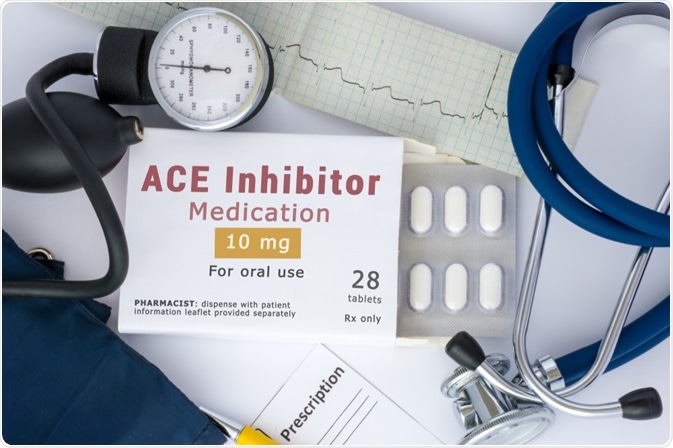Angiotensin-converting enzyme inhibitors and angiotensin receptor blockers are antihypertensive medicines used to treat high blood pressure. While the enzyme inhibitors work by reducing the level of angiotensin II in the body, the receptor blockers inhibit the function of angiotensin II by directly blocking the specific receptor.
 Image Credit: Shidlovski/Shutterstock.com
Image Credit: Shidlovski/Shutterstock.com
How do angiotensin-converting enzyme inhibitors and angiotensin receptor blockers work?
Angiotensin-converting enzyme inhibitors
Angiotensin-converting enzyme (ACE) catalyzes the conversion of angiotensin I into angiotensin II in the lungs. Angiotensin II is an active vasoconstrictor that narrows the blood vessels and increases systemic blood pressure.
In addition, angiotensin II increases blood osmolality and volume by inducing water and sodium retention in the kidneys.
ACE inhibitors reduce the level of angiotensin II by inhibiting the enzyme, leading to the widening of the blood vessels (vasodilation) and subsequent reduction of the systemic blood pressure.
In addition to treating hypertension, ACE inhibitors are used to manage related comorbidities, including heart failure, heart attack, coronary artery disease, diabetes, chronic kidney diseases, migraine, and scleroderma.
ACE inhibitors generally do not have side-effects. However, some people may develop mild symptoms, including dry cough, dizziness, headache, fatigue, high blood potassium level, and loss of taste sensation.
Also, women, smokers, and black people may develop angioedema, which can be life-threatening if developed in the throat. ACE inhibitors are more beneficial for young and white people.
Pregnant women, or those planning to become pregnant, should avoid taking ACE inhibitors, as it can affect fetal development. The efficacy of the inhibitor can be reduced if taken together with nonsteroidal anti-inflammatory medicines.
Angiotensin receptor blockers
Alike ACE inhibitors, angiotensin receptor blockers (ARBs) are used to treat hypertension and related comorbid conditions. These blockers work by inhibiting the angiotensin II receptors (type I and II), leading to functional inhibition of angiotensin II and subsequent reduction of the blood pressure.
Similar to ACE inhibitors, ARBs sometimes come with mild side-effects, including dizziness, headache, fatigue, flu-like symptoms, gastrointestinal problems, higher blood potassium level, and angioedema. These medicines are also not recommended for pregnant women.
Is there any difference between ACE inhibitors and ARBs?
In terms of therapeutic outcomes, both ACE inhibitors and ARBs are considered to be the first-line antihypertensive medicines for lowering blood pressure in patients with cardio-metabolic or renal disorders.
These medicines can provide long-lasting blood-pressure-lowering effects when consumed together with calcium channel blockers or diuretics.
In addition to lowering blood pressure, both ACE inhibitors and ARBs are highly functional in preventing or improving related comorbidities, such as left ventricular hypertrophy, microalbuminuria, proteinuria, myocardial infarction, stroke, heart failure, atrial fibrillation, renal disorder, diabetes, and metabolic syndrome.
However, both types of medicines are not recommended for pregnant women and patients with bilateral renal stenosis or hyperkalemia (blood potassium level of more than 5.5 mmol/L).
 Image Credit: Seasontime/Shutterstock.com
Image Credit: Seasontime/Shutterstock.com
Does ACE inhibitors and ARBs provide equal therapeutic benefits?
Despite having similar therapeutic outcomes, some pitfalls are associated with both ACE inhibitors and ARBs.
The major advantage associated with ARBs is higher treatment compliance and a lower rate of withdrawal due to adverse events, as compared to ACE inhibitors. Cough is the main adverse event responsible for treatment discontinuation in patients having ACE inhibitors.
Also, the incidence of angioedema is higher in these patients, as ACE inhibitors can directly affect the metabolism of bradykinin and tachykinins and increase the risk of skin and tissue edema.
Although ARBs are associated with better treatment outcomes due to greater compliance, current guidelines on the arterial hypertension management recommend ACE inhibitors over ARBs because of specific health reasons. According to the guidelines, ARBs are preferred for patients having ACE inhibitor intolerance.
Importantly, ACE inhibitors are more beneficial than ARBs in terms of reducing all-cause mortality and cardiovascular-related mortality. Clinical studies have shown that people having ARBs are at higher risk of developing hypotension, renal abnormalities, and hyperkalemia.
Regarding long-term clinical outcomes, ARBs are known to significantly increase the risk of recurrent myocardial infarction in hypertension patients who have left ventricular ejection fraction of less than 50%. However, the risk is comparable to ACE inhibitors in patients with a left ventricular ejection fraction of ≥ 50%.
Based on different clinical observations, the Eighth Joint National Committee recommends ACE inhibitors or ARBs for treating hypertension patients with chronic kidney disease. Also, the committee recommends ACE inhibitors as an initial choice of treatment for patients who are not black.
According to the National Institute for Health and Care Excellence, ACEs are the first-line medicines for treating hypertension patients with diabetes.
Is it safe to treat patients with a combination of ACE inhibitor and ARB?
It is not recommended to treat hypertension patients with both ACE inhibitor and ARB. The combination therapy is known to cause adverse clinical outcomes (hospitalization due to congestive heart failure) and higher mortality related to cardiovascular diseases, myocardial infarction, or stroke.
References